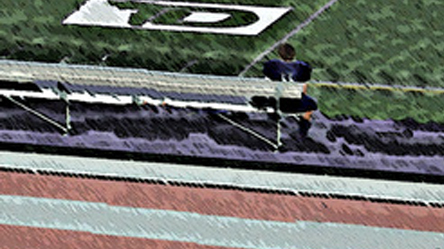Playing Time
Perhaps more than any other single issue, the topic of playing time for kids and youth is the most emotionally charged issue for athletes, coaches and parents. At every level and in every sport, athletes continually struggle with the amount of time they spend watching the action instead of being in the action. Every athlete wants playing time, yet only a select few will actually consistently achieve it.
Within the London Junior Mustangs Football Club, our coaches pick players to form a team that will win games. Our coaches choose players with good skills, athletic ability and a certain aggressiveness and 'team-first' attitude. Coaching decisions are made to field the best team possible which often results in certain players getting more or less playing time than others.
We all know that playing time is purely opinion and judgment. What we all need to remember is that playing time is not just about playing the best players; it's about playing the players that play the best together. That is a powerful distinction.
Our Jr. Mustangs coaches are well equipped to assess individual player skills and at putting athletes into positions where they will contribute to the success of the team. Our coaches are in charge with who plays and how much they play.
As such, in our organization, there is no guaranteed playing time for any player. For those of you who are considering our tryouts or you currently have a son on one of our teams, it is very important that you understand this message. If you disagree, then perhaps our Club is not the right fit for your child and family; and that is perfectly o.k.!
If you have specific coaching concerns, issues or questions, you are welcome to contact any of our coaches and they will gladly speak with you or meet any time.
Want more time on the field?
Being one of the best at something is never easy and it's usually very difficult getting there. Remember athletes, you can’t just show up to school and get 90% in all of your classes; you have to work hard and earn them. Adults can’t just show up to work and get paid for doing nothing; they have to work hard to earn a pay cheque. The same goes for you.
The bottom line is this, as an ATHLETE:
YOU have to make the decision to get better and earn more playing time because YOU have demonstrated that you have the talent, the commitment and drive.
If an athlete wants more playing time, there are a few things that he can do:
1. Speak with the coach privately. The athlete should ask his coach about what he can do to improve his chances of earning more playing time on the field. He then will need to act on those suggestions.
2. Work diligently and self challenge. All professional athletes know that in a high-performance world, mediocrity is unacceptable. They work continuously to improve their performance and skills to separate themselves from the pack. Great athletes are self aware and know what they need to work on; and they always commit large amounts of their time to fitness, eating well and getting a lot of sleep. The best athletes know that all of this work will ensure that they are ready to go when their number is called.
3. Stay engaged and ready to play with a starter’s mentality. You need to perform at practice with the same focus and intensity you exude when competing on the field. If you want something then you have to work for it. In life, you are going to run into situations over and over again where someone is ahead of you. You can’t just opt out or quit. Push yourself to succeed and you never know when you might find something you are better at.
4. Great athletes work hard all of the time and they hustle in practice. This applies to everything. You won’t get noticed if you are acting like everyone else - change it up by working harder than everyone else. This will drive up the intensity for everyone and make the team better; this also shows very good leadership skills. Arrive at practice early and practice your position on your own. Be the last athlete to leave practice. Don’t take a lot of time between drills or reps and definitely don’t hide and think your coach can’t see you not working. Your coaches know and you are not just cheating yourself, but you are also cheating the team. Don’t ever give the coach a chance to bench you because of your actions or inactions. Be disciplined and show your commitment to getting better and to the team.
5. Study and become a student of the game. This includes studying multiple positions to give you more options. Watch film; study your playbook. Study the team that you will be going up against; watch the plays that they used most often. Study the player that you will be going up against; pick out anything that will tip you off to what he is doing. Watch yourself on tape - is your technique really as good as you think? Are you really hustling every play? Learn about all positions; never be in a position on the field and not know what to do. A person who doesn't make mental errors is hard to take out of the game!
6. Show commitment. Commitment is what an athlete does to better himself, by listening to the coaches, doing the best he can in all drills and practice scrimmages, demonstrating to the coaches his desire to play the game, for himself and his teammates.


